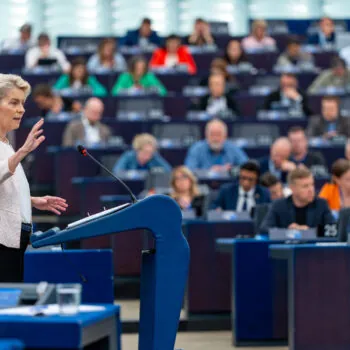The anti-Islamist right wing PEGIDA (= Patriotic Europeans against the Islamisation of the Occident) movement has been dominating public debate in Germany over the past three months or so. PEGIDA rallies used to attract up to 20,000 protestors although figures are slowly declining. Their unsavoury leader, Lutz Bachmann, has now stepped down and the leadership of the movement has split. But this does not mean that the underlying issues are going away.
The movement originated in Dresden, Saxony, where non-Germans make up the population share of only just over 2% – few of them from a Muslim background. The inexistent “Islamist threat” has become the target for people’s resentment against the political class and an outlet for their vaguely defined fears. Dresden used to be the centre of the “Monday Demonstrations” that ultimately brought down the regime in the GDR in 1989. PEGIDA’s supporters in Dresden were doing comparatively well during the GDR and were hopeful that the reunification would bring even more prosperity – but many now feel that their hopes were betrayed. Lower middle-class people in particular ended up with frustrations that were further fuelled by a self-satisfied and uninspired political class that refused to take their concerns seriously. The initiators of PEGIDA were able to capture this public sentiment.
It seems easy to project one’s dissatisfaction and bitterness on a scapegoat, in this case: Muslims who you do not have to confront in your daily life and on whom you can project all kinds of assumptions. Populist leaders and movements can easily make use of these mechanisms when mobilising people. But mobilising for what?
PEGIDA stands for everything that people are “against”. And the sad bottom line is that there is a frightening degree of racism in Saxony where the right wing, anti-EU Alternative für Deutschland party is scoring high as well. PEGIDA is not a “German” movement. Nevertheless, it tells us something about the state of democracy in Germany.
The political establishment in Germany still seems to be at a complete loss when it comes to “taking on” or “engaging with” PEGIDA supporters. They might meet with PEGIDA supported but certainly not with its leadership. Yet at the same time they have no idea who PEGIDA supporters are and what they want. Are they just “disillusioned” and “angry”, do they feel that established political parties are aloof and “not engaging with their issues”, or are they simply outright racist, nationalist and right-wing?
The truth lies probably somewhere in between, especially because the resentment of protesters extends to “the media”, “politicians” and “the public”. PEGIDA supporters do not tend to belong to a political party or any religious organisation – some of the typical factors for “integration” in Germany – they tend to be anti-intellectual, and they are deeply sceptical about the political system and the political class. Democracy is not seen to be delivering what they are asking for. Yet the anti-immigrant discourse, a focus on eroding family values, or Germany’s relationship with Russia are real fears by real people – whether I like it or not. The post-’68 victory of liberal values in Germany might meet my expectations of a country worth to be living in but it does not satisfy the needs of all of my fellow citizens.
Thus, ultimately, the problem goes much deeper. In a society – not only in Saxony – where people distrust public discourse and the political process, democratic politics cannot happen. And the liberal leftwing mainstream has nothing to offer in terms of a democratic renewal. There is a visionary void across all political parties in Germany and most of the rest of Europe. The question now is not so much who is to blame but who is responsible for coming up with solution. The answer I propose is: all of us are.
It does not matter why exactly people – citizens of a democratic country – withdraw from the public sphere: be it because they are angry or because they can’t be bothered. Whatever their motivation, by rejecting the system without offering an alternative they are paving the way for populist leaders. And they are also allowing incumbent political leaders to continue their anaemic style of running countries.
Interestingly, a recent poll about German university students showed that political apathy goes across all societal groups: today’s students seem apolitical and anti-intellectual. Only 45% show a real interest in politics, 73% pursue the goal of “being able to afford nice things” as a reason for their studies at university, half of them are sceptical about immigration and believe that too much of it putting too much stress on Germany.
When we strip the issue down to its essence we can only conclude: this is about the most basic things that make us human. It’s about who we believe we are, what we are striving for, and what society we want to live in. And it’s about the way we relate to that society. The recent 70th anniversary of the liberation of Auschwitz brought it home: unless we care, we allow evil to creep into the tissue of our societies. Unless we reach out to “the other” and identify with the common good the change we are longing for does not stand a chance.
Fortunately, we live in a country where a free press and political parties are able to organise opinions and sentiments. The tools for change are there – let’s make use of them.



